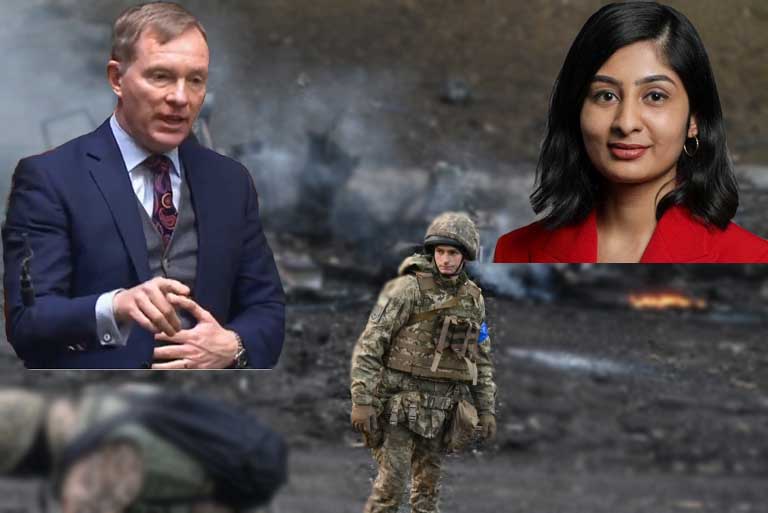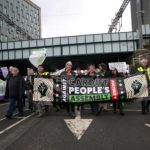- Chris Bryant MP deletes tweet calling for UK/Russian dual nationals to be made to ‘choose’ nationality and avoids questions over the issue.
- Cynon Valley Labour MP Beth Winter forced to remove name from anti-war statement, as fellow socialist MP Zarah Sultana says that a “Mccarthyite environment” is being whipped up against those in Britain who oppose Western military intervention.
- Comes as Russia launches invasion of Ukraine, dragging the country into a deadly conflict and sparking anti-war protests across Russia and Eastern Europe.
By SC Cook
Chris Bryant, the Labour MP for Rhondda Cynon Taf, has not responded to questions over why he sent out a series of Tweets – now deleted – where he said Russian dual nationals in the UK must be made to choose between which national identity to keep and called for some Russians to be deported.
Bryant sent the Tweets out on the same day that the Russian army launched a military invasion of Ukraine, including troops moving into the country at multiple border crossings and aerial bombardment.
It is unclear exactly how many people have died as a result of the invasion so far, though on Saturday Ukraine’s health minister said 198 Ukrainians had been killed, 3 of which were children.
Many figures and institutions in Welsh public life have reacted by declaring solidarity with Ukraine, with the Senedd in Cardiff Bay lighting up in the colours of the Ukrainian flag.
On the steps of the Welsh Parliament on Sunday, a crowd gathered for a rally against the Russian invasion along with rallies in Swansea and Aberystwyth, and an open-air meeting Bute Park. On Monday at 6pm, a similar event is due to be held, backed by Plaid Cymru leader Adam Price, Welsh Labour’s Mick Antoniw and the Wales TUC.
There have been demands for the UK Government’s notorious ‘hostile environment’ policy against asylum seekers to be dropped, so as to allow fleeing Ukrainians into Britain.
Part of the Polish community in Wales have even set up a dedicated Facebook group to collect donations to those escaping the conflict.
But there has been a contrast between the actions of ordinary people in response to the crisis and that of figures in the British establishment.
This was seen in outbursts last week against Russians living in Britain, coming even as Russians themselves braved a crackdown to protest against Putin’s decision to invade Ukraine. The incidents have been coupled with a push for military escalation and attacks on anti-war figures who are critical of the West and NATO’s role in the crisis.
MP Chris Bryant’s post, written on Thursday, was shared over 1,400 times before it was taken down, and began with by saying ‘I would now’ followed by a series of actions the British state & authorities should take.
After calling for the suspension of all Russian banks, extractive industries and members of its parliament, the MP said “send 2/3 if not all Russian embassy staff back”, “cut rail, shipping and air links with Russia” and “Require UK/Russian dual nationals to choose between nationality.”
He then went on to advocate a “review every Russian national with a tier 1 visa and if necessary deport” and to freeze the assets of all Russians who hold dual nationality and who are deemed “persons of interest.”
The hastily written set of demands was posted around 12.45pm Thursday and deleted just after 2.15pm, having already been seen by thousands of people online.
Mr Bryant did not respond to repeated emails on Friday asking him to explain his comments, whether he stood by them or whether he would like to apologise.
The outburst came as another MP, the Tory Tom Tugendhat, called for Russians to be expelled point blank.
“We can expel Russian citizens, all of them… We can make a choice to defend our interests, to defend the British people, and to defend our international partners,” he said on Thursday.
When asked later about the comments he said he meant Russians “connected to the Putin regime,” but issued no apology.
On Friday, writing in The Herald Scotland, the commentator Neil Mackay said that Russia “must suffer for the actions of its leader.”
“Russia must be broken, in the hope that by breaking the regime economically and rendering it a pariah state on the world’s stage, brave and decent Russian people will rise up and drag Putin from power.”
Kat Boyd, who previously stood as a left wing pro-independence candidate to the Scottish Parliament, hit back at Mackay.
“No nation’s citizens should suffer collective punishment as a consequence of a cruel & tyrannical leader’s actions,” she said.
David Jamieson, a co-host of the Contercast podcast with Boyd, said the incidents were a sign of how pro-war jingoism was taking hold: “If you ever wanted to understand how nationalism and war fever could have swept millions of Europeans into WW1, today gave you an insight.”
Escalation
The reaction against ordinary Russians from British MPs is also part of a wider drive to talk up the idea of Western military action and silence those who advocate a different approach.
Tugendhat, who is seen as a rising Tory MP and has already said he’ll run for the party leadership, also called for the Treason Act to be updated to charge those “who seek to undermine the security and safety of the British people.”
On Thursday, the former Brexit Minister David Davies MP called on the West to impose a ‘no-fly’ zone over Ukraine – in reality a military battle with Russia over who controls the country’s airspace.
“If this is confined to the airspace over Ukraine,” he wrote, “and is based on a request from President Zelenskyy, this should be perfectly legal under almost any interpretation of international law. It will also reduce the risk of escalation.”
The situation is incredibly dangerous, with the Russian military, led by President Vladimir Putin, showing its willingness to use lethal force against a civilian population on its border, many of whom either see themselves as ethnically Russian or who have strong links to the country.
Far from reducing the risk of escalation, NATO seeking to impose a no-fly zone could spark an even wider and more deadly conflict involving NATO countries nearby..
But the invasion is already dragging into even more dangerous territory, with Belarus, an ally of Russia, announcing its intention to support Russian troops and the European Union sending 500m Euros worth of military aid to Ukraine.
There have also been reports of ordinary Ukrainians being forced to fight the invading Russian forces, at huge risk of being killed.
Speaking on Radio 5 Live on Friday, the head of the Ukrainian cricket association, Kobus Olivier, holed up in his apartment in Kyiv, described how someone he knew, a 23 year old man, was dragged from his home to fight.
“They pulled him out of his apartment, they knocked on the door, they physically pulled him out, Ukrainian Police, they put a rifle in his hand, he’s gotta go and fight. They [the Russian military] are just gonna kill these people, they’re not trained soldiers, they’re cannon-fodder, they’re up against one of most highly trained armies in the world.”
Whilst US President Joe Biden has said that the US military and NATO forces won’t be sent into Ukraine in response, he has confirmed troop and artillery build-up in nearby Baltic states which are members of NATO. The West’s imposition of sanctions is also hitting the Russian economy hard, and not only Putin’s inner circle and associates.
“I can’t overstate how unprecedented this is,” wrote Max Seddon, the Financial Times’ Moscow bureau chief, on Monday. “Most Russians don’t have savings. 20m are in poverty. Migrants send remittances to Central Asia. It’s ordinary people who will really suffer.” He went on to say that there’s no sign that sanctions will do anything but make Putin “double down.”
Some hopes are on talks between Russia and Ukraine today, but the potential for escalation is clear.
Despite this, however, anti-war activists in Britain critical of NATOs role in Eastern Europe and against Western military intervention have found themselves on the receiving end of a string of political attacks.
Labour & NATO
Attacks on those in Britain who are critical of NATO have mainly been led by the leadership of the Labour Party, which has sought to quash criticism of Boris Johnson’s response and the West in general.
On the day Russia invaded, Beth Winter, the Labour MP for Cynon Valley and ally of Jeremy Corbyn, was made to remove her name from a statement by the Stop the War Coalition that had been issued on the 18th February.
The statement was highly critical of the West’s role in escalating military tensions in Eastern Europe and of its expansionist policy in the region.
“We refute the idea that NATO is a defensive alliance, and believe its record in Afghanistan, Yugoslavia and Libya over the last generation, not to mention the US-British attack on Iraq, clearly proves otherwise,” it said
Winter was one of 11 left wing Labour MPs who removed their name from the statement within an hour of being instructed to do so by the Labour Whips office, on threat of suspension, and came after Keir Starmer’s recent public attack on the Stop the War Coalition.
Commenting on the decision to force the MPs to remove their names, one party source told the Mirror “You can be a mouthpiece for the Kremlin or a Labour MP. But not both.”
An article in the Financial Times also upped the ante on left wing anti-war MP. The piece, titled, “Britain’s pro-Russian politicians put on spot by Ukraine invasion,” said that left-wing MPs “criticism of the western alliance was the latest sign of pro-Russian sentiment across the political spectrum” and likened them to figures on the far right such as Donald Trump and Nigel Farage.
A Labour spokesperson told the paper that the party had no place for those critical of the West’s record in Iraq and elsewhere:“With Keir Starmer’s leadership there will never be any confusion about whose side Labour is on — Britain, Nato, freedom and democracy — and every Labour MP now understands that.”
On Friday, Labour then suspended the social media account of its youth wing, Young Labour, saying that it had “recently become actively detrimental to the Party’s core objectives.”
It was unclear if the action was in response to a specific Tweet, but a day earlier the group had accused Boris Johnson of “warmongering” and called for a diplomatic solution, saying now was “not time for further ratcheting up of tensions.”
On the same day, Zarah Sultana, a prominent Muslim and socialist MP who had originally put her name to the Stop the War statement, revealed that she had been sent a death threat calling her “Putin’s whore.”
The MP for Coventry blamed the threat on media smears and right wing Labour MPs, who had suggested that anti-war parliamentarians in Britain were “Nazi-apologists.”
She also described being called an “agitator for Putin’s Russia” by the leader of Coventry Conservatives. And the local paper, Coventry Live, was forced to remove an image of Sultana next to a reference to the “Kremlin’s mouthpiece” quote from a Labour source.
“This Mccarthyite environment doesn’t just increase the threat of violence to public figures,” she wrote in a statement, “It also threatens to weaken our democracy, radically narrowing political debate and silencing dissent to establishment opinion. That is deeply unhealthy for our society and must be challenged.”
Sultana contacted the Labour Party Chair over the incident but leader Keir Starmer has not made any comment on the death threats.
Stop the War Coalition
The Stop the War Coalition said that they were not surprised that there had been attacks on the anti-war movement. “The only correct response to these attacks is to take action for peace and support the anti-war movement,” they said.
Stop the War – which led mass resistance to the invasions of Iraq and Afghanistan – has long been criticised by those who defend the West’s military record.
The moves against the group, coming early on in the crisis, can be seen as an attempt by pro-Western figures to neutralise opposition to any potential British military involvement, such as was seen in 2003.
The coalition has been vocal in recent days against the Russian invasion of Ukraine, demanding the immediate withdrawal of Russian troops, but has said the conflict was “thirty years in the making” and that Britain had played “a provocative role – talking up war, decrying diplomacy and increased military deployments to neighbouring countries.”
They maintain that NATO, far from being a purely defensive coalition, is the key alliance with which Western political dominance is asserted, and it has knowingly escalated the crisis by expanding into Eastern Europe.
Over the weekend, the BBCs Middle East editor, Jeremey Bowen, quoted a column from the New York Times in 1997, which said that: “Expanding NATO would be the most fateful error of American foreig policy in the entire post-cold war era…such a decison may be seen to inflame the nationalistic, anti-western and milltairistic tendencies in Russian opinion.”
Commenting on the piece, Bowen said “you could say he had the gift of prophecy.”
Protests
The Stop the War coalition has also declared their solidarity for anti-war protesters in Russia which have erupted across the country following Vladmir Putin’s decision to invade Ukraine.
Russian tennis player Andrey Rublev on Friday wrote “No war please” on a video camera at a major Tennis tournament after winning the semi-final.
Huge protests were also seen in Georgia and Estonia against the war and demanding that the Russian army withdraw from Ukraine.
Anti-war protests in Russia itself could prove especially challenging for Putin, and risk spreading to allied countries such as Belarus and Kazakhstan, giving renewed confidence to rebellions that have recently swept both countries. This would make any military campaign much harder for Russia to sustain.
For this reason, people taking to the streets face a crackdown from the Russian state.
“The irony is that Vladimir Putin will see those anti-war protesters as the enemy within – just as our government (and its loyal opposition) treats us,” said the Stop the War coalition.



